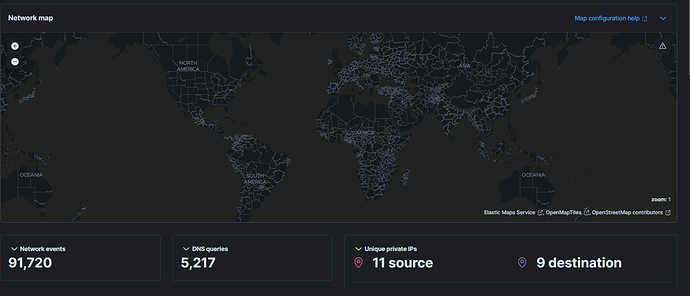Thanks for the notice, I did change the password right away.
Is packetbeat and elastic both on versions
yes - both are 8.3.3
What does this return GET _ingest/pipeline/geoip-info ?
{
"geoip-info": {
"description": "Add geoip info",
"processors": [
{
"geoip": {
"field": "client.ip",
"target_field": "client.geo",
"ignore_missing": true
}
},
{
"geoip": {
"database_file": "GeoLite2-ASN.mmdb",
"field": "client.ip",
"target_field": "client.as",
"properties": [
"asn",
"organization_name"
],
"ignore_missing": true
}
},
{
"geoip": {
"field": "source.ip",
"target_field": "source.geo",
"ignore_missing": true
}
},
{
"geoip": {
"database_file": "GeoLite2-ASN.mmdb",
"field": "source.ip",
"target_field": "source.as",
"properties": [
"asn",
"organization_name"
],
"ignore_missing": true
}
},
{
"geoip": {
"field": "destination.ip",
"target_field": "destination.geo",
"ignore_missing": true
}
},
{
"geoip": {
"database_file": "GeoLite2-ASN.mmdb",
"field": "destination.ip",
"target_field": "destination.as",
"properties": [
"asn",
"organization_name"
],
"ignore_missing": true
}
},
{
"geoip": {
"field": "server.ip",
"target_field": "server.geo",
"ignore_missing": true
}
},
{
"geoip": {
"database_file": "GeoLite2-ASN.mmdb",
"field": "server.ip",
"target_field": "server.as",
"properties": [
"asn",
"organization_name"
],
"ignore_missing": true
}
},
{
"geoip": {
"field": "host.ip",
"target_field": "host.geo",
"ignore_missing": true
}
},
{
"rename": {
"field": "server.as.asn",
"target_field": "server.as.number",
"ignore_missing": true
}
},
{
"rename": {
"field": "server.as.organization_name",
"target_field": "server.as.organization.name",
"ignore_missing": true
}
},
{
"rename": {
"field": "client.as.asn",
"target_field": "client.as.number",
"ignore_missing": true
}
},
{
"rename": {
"field": "client.as.organization_name",
"target_field": "client.as.organization.name",
"ignore_missing": true
}
},
{
"rename": {
"field": "source.as.asn",
"target_field": "source.as.number",
"ignore_missing": true
}
},
{
"rename": {
"field": "source.as.organization_name",
"target_field": "source.as.organization.name",
"ignore_missing": true
}
},
{
"rename": {
"field": "destination.as.asn",
"target_field": "destination.as.number",
"ignore_missing": true
}
},
{
"rename": {
"field": "destination.as.organization_name",
"target_field": "destination.as.organization.name",
"ignore_missing": true
}
}
]
}
}
Did you every disable the GeoIP Database?
While troubleshooting the issue (before posting here), i followed this : https://www.elastic.co/guide/en/kibana/7.17/maps-connect-to-ems.html
To disable EMS, change your [kibana.yml]
1. Set `map.includeElasticMapsService` to `false` to turn off the EMS connection.
I turned it to true again and disbaled it
Did change one of settings?
No

